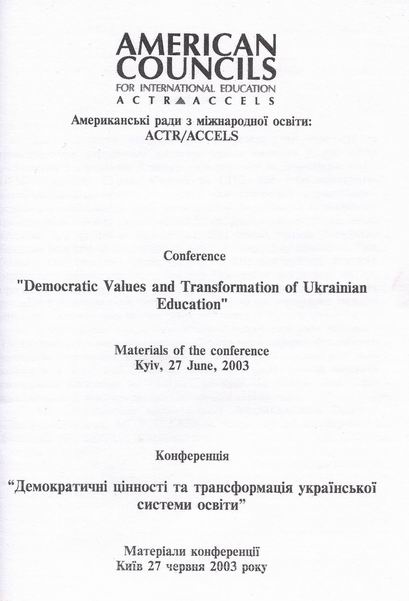
AMERICAN COUNCILS
for international education
ACTR / ACCELS
Conference
"Democratic Values and Transformation of Ukrainian Education"
Conference Materials
Kyiv, 2003
Partnership
Program between National Technical University
“Kharkiv Polytechnic Institute” and Iowa State University
to Implement Distance Education to Ukrainian Women Engineers:
Current
Results and Lessons
Alexander
F. Suk
Ukraine, National Technical University “Kharkiv Polytechnic Institute”
afs@kpi.kharkov.ua
The described Program originated in the successful collaboration between National Technical University “Kharkiv Polytechnic Institute” (NTU “KhPI”) and Iowa State University (ISU) that began in 2000 and confirmed by Memorandum on Mutual Understanding. The initial points of the Project were the following:
-
Due to the fast technical progress within the engineering professions, the technical skills of engineers are often outdated. Ukrainian engineers also need to learn about modern management systems, which are required for today’s successful enterprises;
-
Women in Ukraine as in many other countries are more often denied opportunities for carrier development and advancement than their men colleagues;
-
As higher education in Ukraine struggles to modernize, the organic introduction of the new information technologies must takes prominent place, first of all - distance learning - educational technology, which enables answer to challenges of modern life adequately.
As the way to begin solution of mentioned problems we proposed to develop and deliver the system of courses using distance education technology in its different modes (Internet, Web-CD, video, etc.). Courses to be offered include three groups conditionally named engineering, informational and management ones. The courses will be delivered to a group of women engineers from Kharkiv and Sumy. This initiative has been supported by the grant of the Engineering Informational Foundation (USA).
During realization of the Project we worked through the technology of faculty and learners teams formation, teaching faculty, courses’ development and delivery and management of distance learning process in the real Ukrainian conditions with real and sometimes weakly prepared learners and with all difficulties that can and can’t be awaited.
Now the Project is in the middle of its development. We have solidary team of NTU KhPI faculty, six working distance courses (http://dl.kpi.kharkov.ua), more than 30 learners-engineers from four big machine-building Sumy and Kharkiv plants and, of course, inestimable experience of the distance learning management.
We prepared courses in two modes: “pure” Internet (1) and Web-CD (5). In case of unstable Internet connection such bimodal representation allows to our learners to study courses using CD and at the same time they have opportunity to use all special Web instruments (forum, internal course mail, forum, etc.) for intercourse with professor and other students.
We have written and presented to our students CD_ROM with courses’ content and big files such as video clips, virtual labs and presentations. In addition every student received special guide with guideline, timeline and special notes about all courses. All courses have many color illustrations, gif-animations, and Web references.
Our colleague from ISU was involved in multimedia development of all courses.
In the paper these and other main steps of the Project, such as startup seminar for learners, uninterrupted management of the learning process, methods to increase learners’ motivation, learner, tutor and course evaluation, etc. are described in detail, most important and interesting responses of the learners and professors are cited.
The main conclusions obtained already in this stage of the Project are the following:
-
Distance education technologies are very useful and perspective for life long learning of engineers. The educational market of these technologies in Ukraine is only waiting for real proposals;
-
The American and European experience in the field of distance education is useful and interesting, but taking in account real situation with Internet in Ukraine, now it’s preferably use distance learning in the “mixed” mode when informational and supporting multimedia elements are presented in CD or other local carriers and only intercourse components (tests, forums, chats, etc.) are using through the Web;
-
One of the most complicated problems of the real distance education where using the complex of many different courses is and will be the competent and uninterrupted management through the process (not by the result as it take place in traditional education);
A
distance course obligatory must be multimedia and interactive simultaneously,
i.e. it must include not only text and pictures (they can be presented with
usual book) but also “live” components (video, animation, audio, etc.),
which must work for increasing learners’ interest and motivation for
intercours